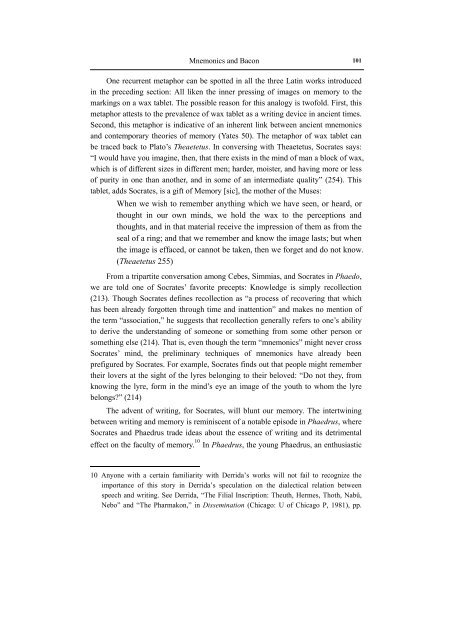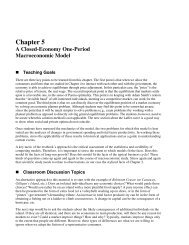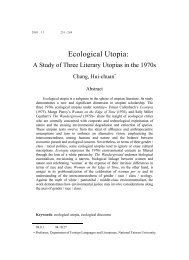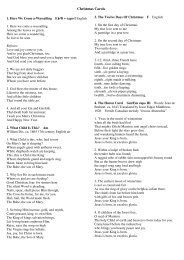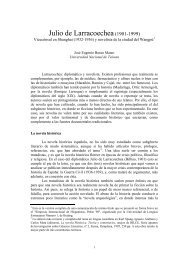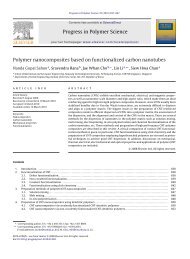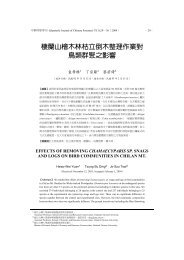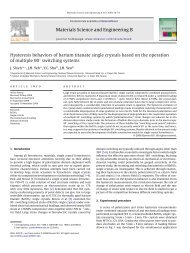Mnemonics and Bacon
Mnemonics and Bacon
Mnemonics and Bacon
Create successful ePaper yourself
Turn your PDF publications into a flip-book with our unique Google optimized e-Paper software.
<strong>Mnemonics</strong> <strong>and</strong> <strong>Bacon</strong><br />
One recurrent metaphor can be spotted in all the three Latin works introduced<br />
in the preceding section: All liken the inner pressing of images on memory to the<br />
markings on a wax tablet. The possible reason for this analogy is twofold. First, this<br />
metaphor attests to the prevalence of wax tablet as a writing device in ancient times.<br />
Second, this metaphor is indicative of an inherent link between ancient mnemonics<br />
<strong>and</strong> contemporary theories of memory (Yates 50). The metaphor of wax tablet can<br />
be traced back to Plato’s Theaetetus. In conversing with Theaetetus, Socrates says:<br />
“I would have you imagine, then, that there exists in the mind of man a block of wax,<br />
which is of different sizes in different men; harder, moister, <strong>and</strong> having more or less<br />
of purity in one than another, <strong>and</strong> in some of an intermediate quality” (254). This<br />
tablet, adds Socrates, is a gift of Memory [sic], the mother of the Muses:<br />
When we wish to remember anything which we have seen, or heard, or<br />
thought in our own minds, we hold the wax to the perceptions <strong>and</strong><br />
thoughts, <strong>and</strong> in that material receive the impression of them as from the<br />
seal of a ring; <strong>and</strong> that we remember <strong>and</strong> know the image lasts; but when<br />
the image is effaced, or cannot be taken, then we forget <strong>and</strong> do not know.<br />
(Theaetetus 255)<br />
From a tripartite conversation among Cebes, Simmias, <strong>and</strong> Socrates in Phaedo,<br />
we are told one of Socrates’ favorite precepts: Knowledge is simply recollection<br />
(213). Though Socrates defines recollection as “a process of recovering that which<br />
has been already forgotten through time <strong>and</strong> inattention” <strong>and</strong> makes no mention of<br />
the term “association,” he suggests that recollection generally refers to one’s ability<br />
to derive the underst<strong>and</strong>ing of someone or something from some other person or<br />
something else (214). That is, even though the term “mnemonics” might never cross<br />
Socrates’ mind, the preliminary techniques of mnemonics have already been<br />
prefigured by Socrates. For example, Socrates finds out that people might remember<br />
their lovers at the sight of the lyres belonging to their beloved: “Do not they, from<br />
knowing the lyre, form in the mind’s eye an image of the youth to whom the lyre<br />
belongs?” (214)<br />
The advent of writing, for Socrates, will blunt our memory. The intertwining<br />
between writing <strong>and</strong> memory is reminiscent of a notable episode in Phaedrus, where<br />
Socrates <strong>and</strong> Phaedrus trade ideas about the essence of writing <strong>and</strong> its detrimental<br />
effect on the faculty of memory. 10 In Phaedrus, the young Phaedrus, an enthusiastic<br />
10 Anyone with a certain familiarity with Derrida’s works will not fail to recognize the<br />
importance of this story in Derrida’s speculation on the dialectical relation between<br />
speech <strong>and</strong> writing. See Derrida, “The Filial Inscription: Theuth, Hermes, Thoth, Nabû,<br />
Nebo” <strong>and</strong> “The Pharmakon,” in Dissemination (Chicago: U of Chicago P, 1981), pp.<br />
101


